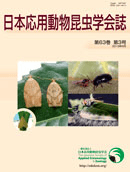
JAPANESE JOURNAL OF APPLIED ENTOMOLOGY AND ZOOLOGY
Scope & Guideline
Diving Deep into the World of Insects and Biodiversity
Introduction
Aims and Scopes
- Integrated Pest Management (IPM):
The journal emphasizes research on integrated control methods for pests, focusing on ecological approaches that combine biological, cultural, and chemical strategies to manage pest populations sustainably. - Population and Community Ecology:
A core area of research includes the study of population dynamics and community interactions among various insect species, which provides insights into the ecological balance and pest outbreaks. - Impact of Environmental Factors on Insects:
The journal explores how environmental changes, including climate variations and agricultural practices, impact insect physiology, behavior, and distribution. - Biological Control Agents:
Research on the use of natural predators, parasitoids, and microbial agents for controlling pest populations is a significant focus, contributing to the development of environmentally friendly pest management strategies. - Insect Physiology and Behavior:
Studies on the physiological responses of insects to various stimuli and their behavioral adaptations are critical for understanding pest management and ecological interactions. - Zoological Studies Related to Entomology:
The journal encourages interdisciplinary research that connects entomology with broader zoological themes, providing a comprehensive view of insect interactions within ecosystems.
Trending and Emerging
- Climate Change Effects on Insect Populations:
Increasing research on how climate change impacts insect behavior, distribution, and life cycles is emerging, as it is crucial for predicting pest outbreaks and developing adaptive management strategies. - Microbial Control Approaches:
There is a growing trend towards utilizing microbial agents, such as bacteria and fungi, for biological control, reflecting an interest in environmentally sustainable pest management solutions. - Behavioral Ecology and Pest Management:
Recent studies increasingly focus on the behavioral aspects of insects, including mating and feeding behaviors, and how these behaviors can be manipulated for pest control, indicating a trend towards more sophisticated pest management techniques. - Multitrophic Interactions:
Research on interactions among multiple trophic levels, including plants, herbivores, and their natural enemies, is gaining prominence, which is essential for understanding ecosystem dynamics and pest management. - Urban Entomology:
An emerging focus on the study of insect populations in urban settings reflects the growing importance of managing pests in urban agriculture and residential areas, addressing public health concerns and sustainability.
Declining or Waning
- Traditional Chemical Control Methods:
Research focusing solely on chemical pesticide applications without considering integrated approaches has become less prominent, as there is a growing emphasis on sustainable and environmentally friendly pest management strategies. - Generalized Insect Taxonomy:
While taxonomic studies are important, there has been a shift away from purely descriptive taxonomy towards research that integrates ecological and behavioral aspects, indicating a waning interest in taxonomy that lacks applied relevance. - Single-Species Studies:
There is a noticeable decline in studies that focus exclusively on single pest species without considering their ecological interactions or the broader context of pest management, as more comprehensive ecological approaches gain traction.
Similar Journals
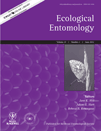
ECOLOGICAL ENTOMOLOGY
Bridging Ecology and Entomology for a Sustainable FutureECOLOGICAL ENTOMOLOGY is a leading peer-reviewed journal published by Wiley, focusing on the dynamic interplay between insects and their environments. With an ISSN of 0307-6946 and an E-ISSN of 1365-2311, this journal has been a pivotal resource in the fields of ecology and insect science since its inception in 1976, and is set to continue until 2024. Recognized for its high academic standards, the journal maintains a prestigious Q1 ranking in both the Ecology and Insect Science categories for 2023, and ranks in the 84th percentile among its peers in agricultural and biological sciences. Although not an Open Access journal, it provides vital insights into ecological processes and insect interactions, making it an essential read for researchers, professionals, and students committed to understanding and conserving biodiversity. The contributions published within its pages significantly advance the knowledge of ecological systems and inform practical approaches to environmental management.
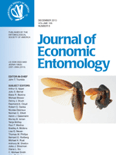
JOURNAL OF ECONOMIC ENTOMOLOGY
Elevating Knowledge in Economic Entomology and BeyondJOURNAL OF ECONOMIC ENTOMOLOGY, published by OXFORD UNIV PRESS INC, stands as a premier interdisciplinary platform for researchers and professionals in the realms of entomology and ecological sciences. With a robust publication history dating back to 1945, this esteemed journal has consistently maintained its reputation for disseminating high-quality research, as evidenced by its prestigious Q1 rankings in both Ecology and Insect Science for 2023. The journal’s impact is highlighted by its excellent Scopus ranks, placing it in the top percentile of Agricultural and Biological Sciences and Environmental Science categories. Aimed at advancing the understanding of insects and their relationships with humans and ecosystems, the JOURNAL OF ECONOMIC ENTOMOLOGY offers a critical forum for original research articles, reviews, and opinion pieces that influence practices in pest management, conservation, and agricultural productivity. Although not an Open Access journal, its findings are pivotal for students, researchers, and professionals striving to address contemporary challenges in entomology and beyond.
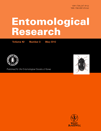
ENTOMOLOGICAL RESEARCH
Championing High-Quality Research in Entomological StudiesENTOMOLOGICAL RESEARCH, published by Wiley, is a prominent journal within the field of Insect Science, with a significant focus on advancing our understanding of entomological studies, including pest management, biodiversity, and ecological impacts of insects. Since its inception in 2007, the journal has served as a vital platform for researchers and practitioners to publish high-quality, peer-reviewed articles that contribute to the growing body of knowledge in this essential discipline. With an H-index illustrating its citation impact and its classification in the 2023 Scopus quartile rankings at Q3, ENTOMOLOGICAL RESEARCH ranks 69 out of 181 journals in its field, positioning itself within the 62nd percentile, which underscores its relevance and contribution to agricultural and biological sciences. Although it does not offer Open Access, the journal remains committed to ensuring that its content reaches the widest possible audience, supporting ongoing discoveries and innovations in insect science. For researchers, professionals, and students seeking to remain at the forefront of entomological advancements, ENTOMOLOGICAL RESEARCH is an indispensable resource.

REVISTA COLOMBIANA DE ENTOMOLOGIA
Innovative Research at the Heart of EntomologyREVISTA COLOMBIANA DE ENTOMOLOGIA, published by the SOC COLOMBIANA ENTOMOLOGIA-SOCOLEN, serves as a vital platform for disseminating research in the field of insect science. With an ISSN of 0120-0488, the journal has established itself as a key resource for entomologists, agricultural scientists, and biodiversity researchers, focusing on the ecology, taxonomy, and behavior of insects within the Colombian context and beyond. Despite its Q4 ranking in 2023, REVISTA COLOMBIANA DE ENTOMOLOGIA strives to enhance its impact within the academic community, offering a space for innovative studies and reviews that aim to advance the understanding of insect-related phenomena. As a publication addressing critical concerns in agricultural and biological sciences, it invites contributions that explore new methodologies and findings relevant to the insect world. Although it does not currently offer Open Access options, the journal's growth from 2004 to 2024 reflects its commitment to evolving with the needs of its readership and contributors, making it an essential reference point for students and professionals alike interested in entomological research.
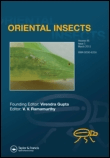
ORIENTAL INSECTS
Fostering Innovation in Entomological ResearchORIENTAL INSECTS is a distinguished journal dedicated to advancing the field of Insect Science, published by the reputable Taylor & Francis Ltd. With its long-standing history since 1967, this journal provides a platform for innovative research focused specifically on the diverse insect fauna of the Oriental region, encompassing topics such as taxonomy, ecology, physiology, and behavior. The journal is indexed with an ISSN of 0030-5316 and an E-ISSN of 2157-8745, making it easily accessible to a global audience. Although it currently does not operate under an Open Access model, its rigorous peer-review process ensures the dissemination of high-quality research. As a Q4 journal in the Insect Science category for 2023 and ranked 103 out of 181 in Scopus, ORIENTAL INSECTS remains a vital resource for researchers, professionals, and students seeking to enhance their understanding of insect biodiversity and conservation. Located in the United Kingdom, it is committed to promoting the latest scientific findings and fostering collaboration among entomologists worldwide, contributing significantly to the academic community.

TURKIYE ENTOMOLOJI DERGISI-TURKISH JOURNAL OF ENTOMOLOGY
Advancing Insect Sciences for a Sustainable FutureTURKIYE ENTOMOLOJI DERGISI - TURKISH JOURNAL OF ENTOMOLOGY is a distinguished journal published by the Entomological Society of Turkey in collaboration with Ege University, dedicated to advancing the field of insect sciences. With an ISSN of 1010-6960 and E-ISSN 2536-491X, this journal plays a pivotal role in disseminating groundbreaking research in entomology, particularly focusing on the diverse aspects of insect biology, ecology, and their applications in agriculture. As a member of the Q3 category in Insect Science according to the 2023 quartiles, it ranks in the 40th percentile of its field, indicating its growing influence and importance within the scientific community. The journal's scope encompasses innovative research findings, reviews, and short communications that contribute to the understanding and management of insect species. While not currently open access, it serves as a vital resource for researchers, professionals, and students seeking to stay informed about the latest developments in entomology from Turkey and beyond, with a commitment to maintaining high scholarly standards through rigorous peer review processes.

BULLETIN OF INSECTOLOGY
Innovating Research in Insect BiologyBULLETIN OF INSECTOLOGY is a prominent academic journal published by ALMA MATER STUDIORUM, UNIV BOLOGNA, Italy, specializing in the field of Insect Science. The journal, with ISSN 1721-8861 and E-ISSN 2283-0332, has established itself as a vital resource for researchers and professionals interested in the diverse aspects of entomology and its applications. It ranks in the Q2 category for Insect Science as of 2023, placing it among the top journals in its field with a Scopus rank of 79 out of 181. The BULLETIN OF INSECTOLOGY is committed to disseminating high-quality research and innovative studies, facilitating open dialogue and collaboration among scientists. As an essential platform for sharing groundbreaking findings, it contributes significantly to the body of knowledge in agricultural and biological sciences, making it an invaluable asset for scholars and practitioners alike. With coverage from 2002 to 2024, this journal continues to foster advancements in entomological research and its importance in tackling environmental challenges.

Frontiers in Insect Science
Unleashing Knowledge for Sustainable Insect ManagementFrontiers in Insect Science is a pioneering open-access journal dedicated to the advancement of knowledge in the field of insect science. Published by FRONTIERS MEDIA SA in Switzerland, this journal serves as a vital platform for researchers, professionals, and students to disseminate high-quality, peer-reviewed research spanning diverse topics within insect biology, ecology, and pest management. Since its establishment in 2021, the journal has gained recognition, ranking in the Q2 category of Insect Science with a Scopus ranking of #92 out of 181 in the field. With a commitment to promoting open access and collaboration, Frontiers in Insect Science is instrumental in fostering innovative research and practical applications essential for combating biodiversity loss and enhancing agricultural sustainability. As a freely accessible resource, it invites contributions that impact both fundamental and applied insect research, connecting a global network of scholars eager to explore the fascinating world of insects.
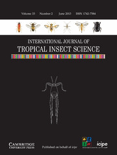
INTERNATIONAL JOURNAL OF TROPICAL INSECT SCIENCE
Pioneering Insights into Tropical EcosystemsINTERNATIONAL JOURNAL OF TROPICAL INSECT SCIENCE, published by Springer International Publishing AG, is a leading interdisciplinary journal dedicated to advancing knowledge in the fields of insect science and ecology. With its ISSN 1742-7584 and E-ISSN 1742-7592, this journal provides a platform for researchers to publish high-quality, peer-reviewed articles that explore various aspects of tropical insect biology, behavior, and their ecological impacts. As evidenced by its Q3 ranking in both Ecology, Evolution, Behavior and Systematics and Insect Science, it plays a vital role in fostering scientific dialogue and innovation within these disciplines. Researchers affiliated with the journal benefit from its visibility and growing impact, as demonstrated by its Scopus ranks, with a percentile standing of 61st in Insect Science. Although the journal is not open access, it still reaches a wide academic audience, making significant contributions to our understanding of tropical ecosystems. Situated in Switzerland, this journal is crucial for students, professionals, and researchers invested in the intersection of entomology and ecological science.
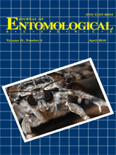
JOURNAL OF ENTOMOLOGICAL SCIENCE
Innovative Research for a Deeper Understanding of InsectsJOURNAL OF ENTOMOLOGICAL SCIENCE, published by the Georgia Entomological Society Inc, is a crucial resource in the field of insect science and ecology. With a rich history since its inception in 1993, the journal provides a platform for innovative research and comprehensive reviews addressing various aspects of entomology. Although not an open-access journal, it is highly regarded within its community, holding a Q3 ranking in Agronomy and Crop Science, Ecology, Evolution, Behavior and Systematics, and Insect Science as of 2023. Each issue promises to contribute valuable insights to professionals, researchers, and students alike, making it an essential publication for those looking to stay abreast of developments in entomological studies. The journal's editorial commitment ensures that it remains at the forefront of entomological research through rigorous peer reviews and a dedication to scholarly excellence.